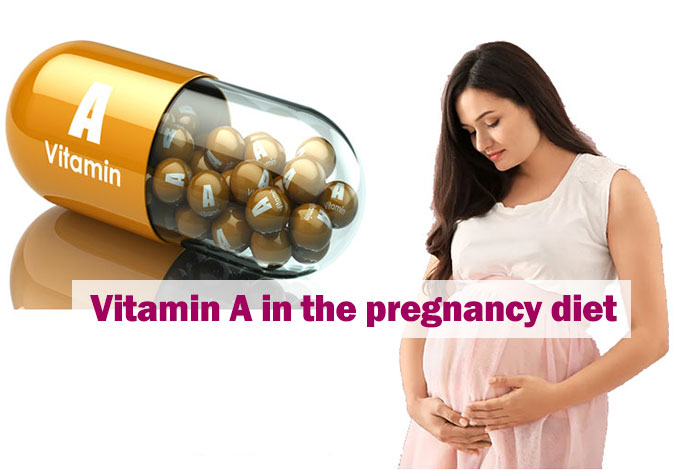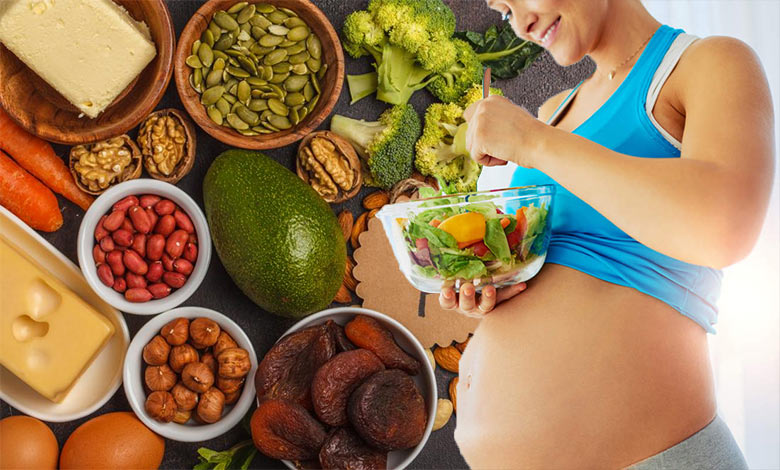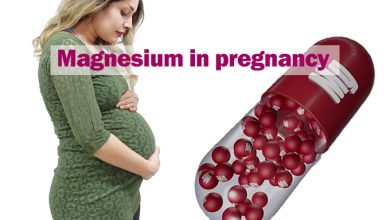Vitamin A in the pregnancy diet

Vitamin A is one of the most important vitamins for your body during pregnancy. But how much vitamin A should you consume and which foods contain vitamin A? In this article, find out about the need and amount of vitamin A consumed during pregnancy.
Related article: vitamins in pregnancy
Why do you need vitamin A during pregnancy?
Vitamin A is a fat-soluble vitamin that is stored in the liver. This vitamin is very important for the development of fetal organs. Some of these bodies include the following:
- Heart
- Lungs and respiratory system
- kidneys
- eyes
- bone
- Circulatory system
- Central nervous system
Vitamin A is especially important for women who are about to give birth, as this vitamin helps repair body tissues after childbirth. Vitamin A also helps maintain normal vision, fights off infections, supports the immune system, and aids in fat metabolism.
How much do you know about vitamin A?
Vitamin A exists in two forms. Preformed vitamin A and provitamin A carotenoids (precursor carotenoids of vitamin A). Preformed vitamin A, also called Retinol, is used directly by the body and is typically found in animal products such as eggs, milk, and liver.
Provitamin A carotenoids are found in fruits and vegetables, but your body must convert this type into retinol. More than 600 carotenoids are found in nature, but only a few can be converted into retinol. Beta-carotene is the most common.
RAE is the standard measurement scale for vitamin A and stands for “retinol activity equivalent,” which refers to the strength and source of vitamin A. One microgram of retinol (preformed vitamin A) equals one microgram of RAE, but 12 micrograms of beta-carotene or 24 micrograms of alpha-carotene equals one microgram of RAE.
But an older measurement standard that’s still in use, especially on supplemental fact labels, is the international unit, or IU. It is not easy to convert IU to RAE because it is related to the type of vitamin A. For example, 900 mcg of RAE can be between 6,000 and 36,000 IU of vitamin A.
How Much vitamin A do you need during pregnancy?
Women need the following amounts of vitamin A at different times in their lives:
- Non-pregnant women: 700 micrograms RAE per day
- Pregnant women of 18 and younger: 750 mcg RAE per day
- Pregnant women of 19 and older: 770 mcg RAE per day
- Breastfeeding women of 18 and younger: 1,200 mcg RAE per day
- Breastfeeding women 19 and older: 1300 mcg RAE per day
Plus, you don’t need to get exactly the recommended amount of vitamin A every day. Instead, aim for your average daily or weekly intake of vitamin A to reach the recommended amount. Is it possible to take too much vitamin A?

Vitamin A is found in meat, dairy products, fish, eggs, and fortified cereals in the form of preformed vitamin A or retinol. Vitamin A is also found in most fruits and vegetables, mainly in the form of carotenoids.
During the charging period Women 19 and older, whether pregnant or breastfeeding or not, should get no more than 3,000 mcg RAE, equivalent to 10,000 international units or IU of preformed vitamin A, per day from supplements, animal sources, and fortified foods.
For women of 18 and younger, the maximum intake allowed is 2,800 micrograms RAE, equivalent to 9,333 IU.
This is an important reason why you shouldn’t double your supplements during pregnancy or take an additional supplement that your doctor hasn’t recommended.
Most pregnancy supplements contain at least some of their vitamin A in the form of beta-carotene, but some over-the-counter brands, other types of multivitamins, and some fortified foods contain significant amounts of preformed vitamin A.
Always read the product label or show your doctor all supplements before taking them.
Also remember that due to the risk of birth defects from taking too much vitamin A, pregnant women and those trying to conceive should avoid Isotretinoin, the acne medication also known by the brand name Accutane, and avoid other retinol-related drugs (a compound of vitamin A), such as topical Tretinoin (Retin-A), which is used for skin conditions.
What are the food sources of vitamin A?
Fruits and vegetables, especially oranges, yellow fruits, and leafy greens, are rich in beta-carotene and the best sources of vitamin A. You’re also likely to get good amounts of preformed vitamin A from milk and fortified cereals.
The entire liver, such as chicken liver, sheep, cattle, and other birds, contains the largest amount of vitamin A, to the extent to eat it during pregnancy should be limited to once or finally twice a month, only for relieving cravings, to make sure you do not get too much at the same time.
85 grams of cow liver can contain more than eight times the recommended quantity of vitamin A during pregnancy, more than double the quantity that is considered safe in one day and this is dangerous for your fetus. Some good sources of food vitamins include:
- One medium-cooked sweet potato (elongated potatoes that are orange inside) 961 micrograms RAE, equivalent to 19218 international units or IU
- Half a glass of cooked pumpkin (pumpkin): 953 micrograms of RAE, equivalent to 19065 international units or IU
- Half a glass of cooked squash: 572 micrograms of RAE, equivalent to 11434 international units or IU
- Half a glass of mashed sweet potatoes: 555 micrograms of RAE, equivalent to 11091 international units or IU
- Half a glass of chopped raw carrots: 534 micrograms of RAE, equivalent to 10692 international units or IU
- Half a glass of cooked spinach: 472 micrograms of RAE, equivalent to 9432 international units or IU
- Half a medium cantaloupe: 466 micrograms of RAE, equivalent to 9434 international units or IU
- Half a glass of cooked cabbage: 443 micrograms of RAE, equivalent to 8854 international units or IU
- Half a glass of cabbage or cabbage, cooked: 361 micrograms of RAE, equivalent to 7220 units
28 grams of cereals for breakfast, enriched oats: 215 micrograms of RAE, equivalent to 721 international units or IU - A mango: 181 micrograms RAE, equivalent to 3636 international units or IU
- 236 ml of lean milk, with added vitamin A: 149 micrograms of RAE, equivalent to 500 international units or IU
- 236 ml of milk with 2 % fat, with vitamin A: 134 micrograms of RAE, equivalent to 464 international units or IU
- 236 ml of complete, non-fat milk: 110 micrograms of RAE, equivalent to 395 international units or IU
- A large egg: 80 micrograms RAE, equivalent to 270 international units or IU
- Half a glass of cooked broccoli: 60 micrograms of RAE, equivalent to 1207 international units or IU
Preparation and processing, such as chopping, grating or soaking, and cooking foods can make it easier for the body to absorb provitamin A carotenoids, and if at the same time, you pour a small amount of fat, about a teaspoon, for example, on your salad, you will absorb more of this vitamin.
What are the symptoms of vitamin A deficiency?
Since it is easy to get enough vitamins through the diet, vitamin A deficiency is very rare, except in cases where it is the result of some complications, so don’t worry. But some symptoms of vitamin A deficiency can include night vision problems and a weak immune system. People who are deficient in vitamin A can also develop a condition called dry eye or Xerophthalmia, which leads to the thickening and drying of the cornea.
Should You Take Vitamin A Supplements?
Probably not. Most people get plenty of vitamin A from their diets, and prenatal vitamins usually contain vitamin A. Read the label on your supplement to make sure you’re not taking more than the recommended amount and make sure that all vitamin A in it isn’t performed.
If you think you need a vitamin A supplement or have questions about the vitamin A in your pregnancy supplement, be sure to check with your doctor.
What happens if you have too much vitamin A during pregnancy?
Should you have vitamin A when you are pregnant?
Can you use vitamin A skincare when you are pregnant?
